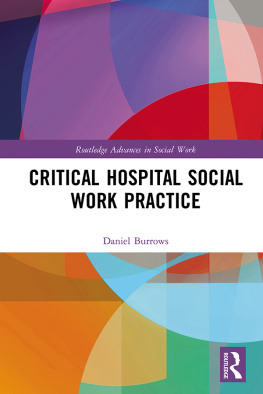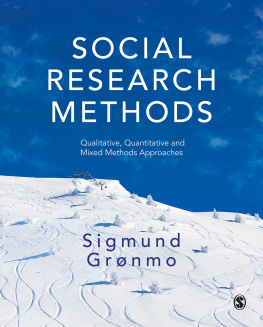SAGE Publications Ltd
1 Olivers Yard
55 City Road
London EC1Y 1SP
SAGE Publications Inc.
2455 Teller Road
Thousand Oaks, California 91320
SAGE Publications India Pvt Ltd
B 1/I 1 Mohan Cooperative Industrial Area
Mathura Road
New Delhi 110 044
SAGE Publications Asia-Pacific Pte Ltd
3 Church Street
#10-04 Samsung Hub
Singapore 049483
Richard Webber and Roger Burrows 2018
First published 2018
Apart from any fair dealing for the purposes of research or private study, or criticism or review, as permitted under the Copyright, Designs and Patents Act, 1988, this publication may be reproduced, stored or transmitted in any form, or by any means, only with the prior permission in writing of the publishers, or in the case of reprographic reproduction, in accordance with the terms of licences issued by the Copyright Licensing Agency. Enquiries concerning reproduction outside those terms should be sent to the publishers.
Library of Congress Control Number: 2017954859
British Library Cataloguing in Publication data
A catalogue record for this book is available from the British Library
ISBN 978-1-5264-0233-2
ISBN 978-1-5264-0234-9 (pbk)
Editor: Robert Rojek
Editorial assistant: Catriona McMullen
Production editor: Katherine Haw
Copyeditor: Kate Campbell
Proofreader: Camille Bramall
Indexer: Richard Webber
Marketing manager: Susheel Gokarakonda
Cover design: Stephanie Guyaz
Typeset by: C&M Digitals (P) Ltd, Chennai, India
Printed in the UK
Its not your genetic code, bank account, ethnicity or social class designation that best reveals your secrets, but your zip- or post-code. Richard Webber and Roger Burrows uncover how your micro-geography reveals who you are in spatially divided nations.
Danny Dorling, Halford Mackinder Professor of Geography, University of Oxford
Weve all heard the saying, you are what you eat, but most of us are incognisant of the you are where you live adage which has come to prominence in contemporary marketing practices. In this superb new book by Richard Webber and Roger Burrows, sociological and geodemographic frameworks are brought together to demonstrate how physical address, and geolocative data, come to define a persons life chances and trajectory in important, if unseen, ways. The innovative approach developed by the authors has resonance for how social research and public policy is enacted, but it also attests the ways in which political and economic power progressively flows through the material environment and its virtual overlay. This wonderfully written and thought-provoking text is sure to become a classic in the urban studies and marketing fields, but also in public and policy debates about data-driven social stratification.
Gavin J.D. Smith, Deputy Head, School of Sociology, Australian National University
Recent political and cultural upheavals have created a growing sense of how geography and identity reinforce one another. In this fascinating study, Webber and Burrows track the pre-history of geodemographic analysis, weaving between the history of sociology with more recent commercial research methods. At a time of rising public awareness of gentrification and left behind populations, and growing anxiety surrounding the power of data analytics, this book provides crucial context for a number of our most pressing contemporary concerns.
Will Davies, Reader in Political Economy, Goldsmiths University of London
Trumps success in the US and that of populist campaigns in Europe are a wake-up call to opinion leaders everywhere. Differences in values and attitudes are displacing traditional classifiers such as age and income as the principal points of fracture in Western societies. The lack of mutual understanding between communities is both the result of these divisions and a major contributor to them.
Classifying consumers according to the types of neighbours among whom they live is routine practice among our US and Canadian clients, revealing as it does the closeness with which these new cultural divisions align with very specific aspects of their customers behaviour. The type of neighbourhood their customers live in adds extra predictive power to models dependent on person-level data sourced from social media and customer data.
The book is remarkable in its ability to integrate insights from different spheres of knowledge: academic theory with commercial practice; marketing with geography and sociology; statistical methods with fresh insights into everyday behaviour. If youre not already familiar with geodemographics then this book will change the way you think about, understand and connect with your fellow citizens.
Jan Kestle, President and CEO, Environics Analytics, Toronto, Canada and the USA
In the last two decades, geodemographic segmentations have transformed the way political parties, in the UK and around the world, understand the electorate and how they target and segment the channels, content and framing of their voter contact and messaging, from doorstep canvassing through leaflets and direct mail to Facebook. This book explores the fascinating detail of the spatial structure of our society and social change, and why the fine-grained scale of those patterns is so important to everyone seeking to win elections today.
Tim Waters, Head of Contact Creator, Targeting and Analysis, The Labour Party
A compelling account of how geodemographics can challenge dated survey methods and simplistic measures of deprivation and of class to enhance our understanding of society through the effective application of commercial sociology.
Richard Harris, Professor of Quantitative Social Geography, University of Bristol
When I introduced geodemographics to the Automobile Association thirty years ago, it generated many novel and valuable insights into customer behaviour. As a result our communications came to be targeted far more precisely. This remains a vitally important application for geodemographics today. However, the scope of geodemographic analysis is much wider than just marketing. The Predictive Postcode uses geodemographics to provide a fresh understanding of social change during a highly dynamic period in the UKs history and in a way which is accessible to the general reader.
Peter Mouncey, Editor in Chief, International Journal of Market Research; former Group Marketing Services Manager, Automobile Association













